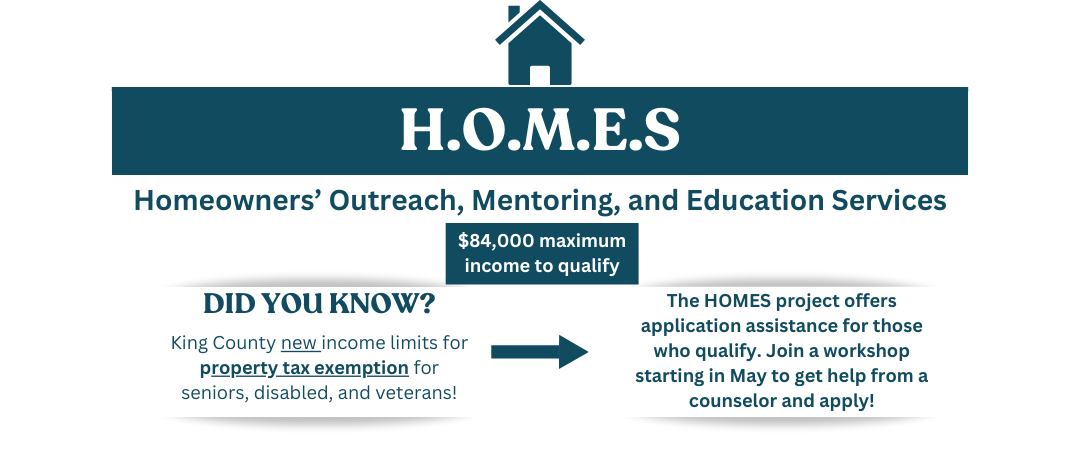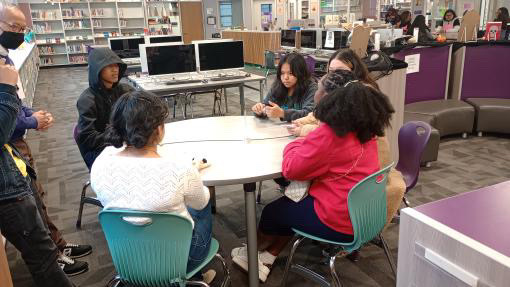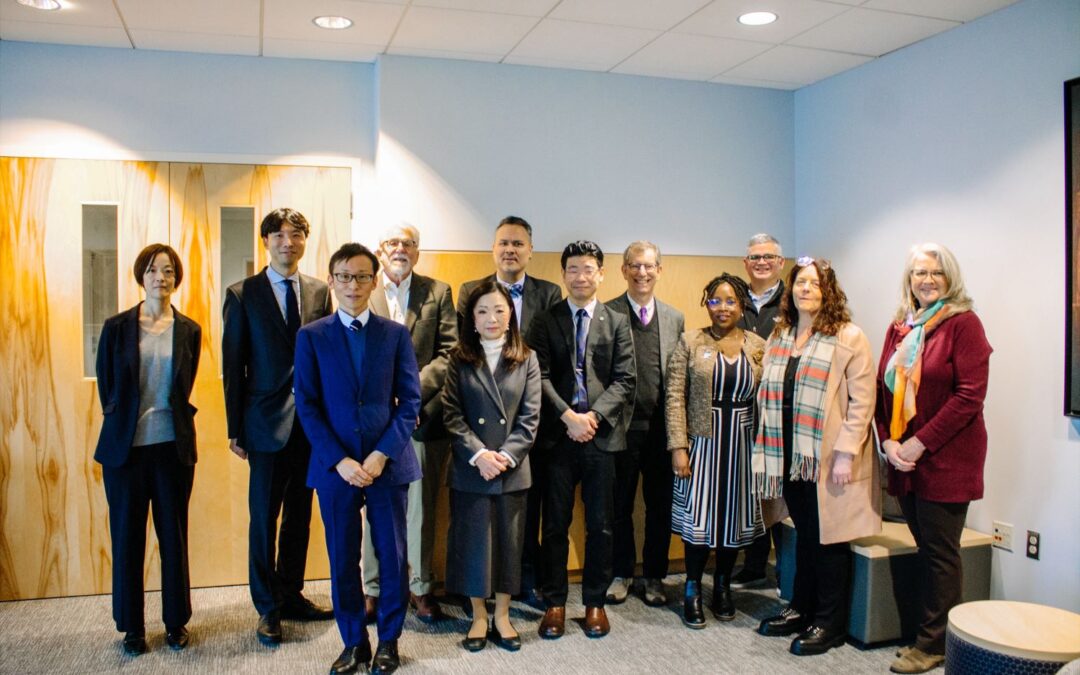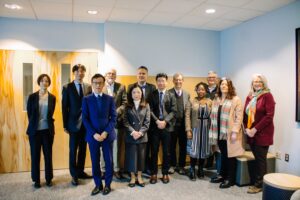
by Meg S | May 14, 2025
Foreclosure prevention through mediation is one of the most effective and underused tools available to homeowners facing financial stress. At the Dispute Resolution Center of King County (KCDRC), mediation helps residents navigate tough conversations with lenders, resolve misunderstandings, and find alternatives before foreclosure becomes a reality.
This work is closely tied to the HOMES program—Homeowners’ Outreach, Mentoring, and Education Services—which helps older adults, veterans, and people with disabilities apply for King County’s property tax exemption. Together, these services provide meaningful support to residents at risk of housing instability.
What is Mediation?
Mediation is a voluntary, confidential process where a neutral third party helps people have structured conversations and work toward agreements. At KCDRC, our trained mediators don’t take sides or offer legal advice. Instead, they create space for understanding, problem-solving, and clarity during difficult moments.
In the context of housing, this can mean facilitating conversations between:
-
Homeowners and mortgage servicers
-
Family members navigating shared property decisions
-
Homeowners and county officials or financial counselors
How Mediation Helps Prevent Foreclosure
When homeowners fall behind on payments or struggle with taxes, communication often breaks down. Mediation brings everyone to the table and offers a chance to:
-
Clarify the situation
-
Identify options such as payment plans, tax relief, or temporary adjustments
-
Connect with support resources, including legal aid and financial counseling
-
Rebuild trust and reduce emotional strain
Mediation can be especially effective when paired with programs like HOMES (Homeowners’ Outreach, Mentoring, and Education Services), which helps eligible residents apply for King County’s property tax exemption. By addressing both the financial and relational sides of housing stress, residents are more likely to find long-term stability.
Real-Life Outcomes
While every situation is different, here are a few common outcomes of housing-related mediation at KCDRC:
-
Agreement on a new repayment timeline
-
Coordination of property tax exemption documentation
-
Family agreement on shared ownership or financial responsibilities
-
Referrals to housing counselors or attorneys when needed
How to Access Help
If you or someone you know is at risk of foreclosure or struggling with housing stress, reach out early. The sooner mediation begins; the more options are typically available.
You can:
You don’t have to face foreclosure alone. Mediation can be the first step toward clarity, stability, and peace of mind.

by Meg S | Mar 31, 2025
Starting in May 2025, a powerful new resource is available to help eligible residents apply for the property tax exemption King County offers. The HOMES program—short for Homeowners’ Outreach, Mentoring, and Education Services—supports older adults, veterans, and people with disabilities in completing their applications for this valuable benefit.
Thanks to a recent income limit increase to $84,000, more residents now qualify for the property tax exemption King County provides, helping ease the financial burden for those who need it most.
What Services Does HOMES Provide?
Application Assistance Workshops
Starting in May 2025, HOMES will host monthly in-person workshops on the third Saturday of each month. During these workshops, trained counselors will be available to help residents complete their property tax exemption applications.
Workshop Dates:
-
May 17
-
June 21
-
July 19
-
August 16
-
September 20
-
October 18
-
November 15
-
December 20
Eligibility Requirements:
What to Bring:
-
Previous year’s tax return
-
Disability verification letter
-
Proof of age/ID (WA driver’s license or similar)
-
Property ownership documents (such as a deed)
-
Records of out-of-pocket medical expenses (doctor’s letters, pharmacy records, bank statements, etc.)
Virtual Information Hub
Beginning in June, the King County Dispute Resolution Center (KCDRC) will host virtual Information Hub meetings. These sessions are open to all homeowners and provide access to a range of community resources focused on foreclosure prevention.
KCDRC is a trusted nonprofit offering mediation and conflict resolution services. Their mediators have helped many residents navigate housing challenges and avoid foreclosure through guided conversations and problem-solving.
How to Get Involved
Whether you’re a homeowner concerned about rising taxes or supporting a loved one through the application process, the HOMES program is here to guide you every step of the way.
Together, we can build stronger, more stable communities—one home at a time.

by Meg S | Mar 19, 2025
Empowering Youth Through Peer Mediation: A Year in Review
We take a moment to celebrate the incredible progress of our Peer Mediation program and reflect on the positive impact it has had on students, staff, and the broader school community. This year, we have seen an increase in student engagement, skill development, and meaningful conflict resolution through peer-led mediations.
Building Skills for Lifelong Success
Throughout the year, students have developed and honed essential conflict resolution skills, including negotiation techniques and effective questioning strategies. Recent training sessions focused on open-ended and closed-ended questions, giving students hands-on practice in identifying the differences and understanding how the right questions can lead to deeper conversations. Another valuable learning experience came from the classic “orange story,” which helped students grasp the importance of uncovering underlying needs to create win-win solutions.

The “orange story” tells of two children fighting over a large, juice-laden orange, each insisting they need the whole fruit. Frustrated by their bickering, their father cuts the orange in half, giving each child an equal share. However, both children burst into tears. When asked why, the first child explains she needed the zest of a whole orange to bake a cake, while the second child needed all the juice to make orange juice. Had they communicated their true needs, they could have both fully benefited rather than settling for less than what they required. This lesson reinforced for students the power of understanding the root causes of conflicts and how creative problem-solving can lead to better outcomes for all involved. The key is finding what’s underneath the reasoning—to find the value there—so that a solution can be crafted that truly meets the needs of everyone involved.
In addition to structured trainings, students participated in peer circles to learn more about open-ended and closed-ended questions. This hands-on experience demonstrated how different types of questions impact communication and conflict resolution. Students were asked to “notice what kind of information comes out’ when using different types of questions, helping them understand how open-ended questions can lead to deeper discussions and better solutions. The overwhelming consensus was that mediation is not just a beneficial tool but a necessary resource within their school communities.
Growth in Peer Mediation Engagement
We are proud to report an increase in peer mediation referrals at Showalter Middle School, with all peer mediation students having participated in at least two mediations. Several of these mediations have resulted in reconciliations, with students becoming good friends again. The increase in referrals is due in part to stronger coordination with school administrators, as well as a greater presence of KCDRC mediation staff in schools. This hands-on involvement has encouraged students to turn to mediation as a trusted resource for resolving conflicts in a constructive and supportive environment.
Students themselves have voiced their enthusiasm for the program, emphasizing how much they value the opportunity to develop leadership skills and contribute to a positive school culture. Students have expressed a desire for the mediation space to feel like “a place that’s warm and welcoming.” These small but meaningful changes reinforce the importance of student-driven solutions in making peer mediation more effective and accessible.
Looking to the Future
As we move into a new grant cycle, we remain committed to sustaining and expanding our conflict resolution programming. While some schools have fully embraced peer mediation, others have expressed interest in alternative approaches to conflict resolution, including relationship skills workshops and career-focused development. We are actively working with school administrators to explore creative ways to adapt our programming to meet student needs while staying true to our mission of promoting healthy communication and problem-solving.
Furthermore, we have received positive feedback from students about how peer mediation has helped them navigate conflicts more effectively. Parents have also expressed support for the program, recognizing its role in fostering better communication and problem-solving skills. Hearing firsthand how mediation has transformed student experiences will help us refine and strengthen our approach moving forward.
A Heartfelt Thank You
None of this progress would be possible without the dedication of our peer mediators, school staff, and community supporters. Your commitment to fostering a culture of peace and collaboration is truly inspiring. As we await updates on our new funding opportunities, we look forward to celebrating the accomplishments of this year’s mediators and planning for an even brighter future.
Stay tuned for our newsletter in June, where we will highlight the year’s successes and share exciting updates on the next steps for our program.

by Meg S | Feb 26, 2025
Conflict as a Path to Understanding
Conflict is a natural part of human interaction, but it doesn’t have to create lasting division. With the right approach, disputes can become opportunities for understanding, healing, and growth. At the Dispute Resolution Center of King County, we’ve seen time and again how mediation fosters resolution while strengthening relationships.
A Case for Mediation: Finding Common Ground
Recently, an organization facing internal challenges turned to mediation for support. The situation involved multiple individuals with differing perspectives, and emotions ran high. The organization’s leadership sought a way forward—one that would prioritize collaboration and understanding rather than tension and division.
Through structured dialogue and professional facilitation, mediation provided a space where all voices could be heard. Skilled mediators, fluent in both English and Spanish, ensured that participants could fully express themselves, breaking down barriers to communication. The process was patient, thoughtful, and focused on finding a resolution that honored everyone’s concerns.
The Impact of Mediation: Voices from Participants
One participant shared that mediation helped them feel “supported and understood,” leading to an outcome they once thought was impossible. Another described the mediators as “patient, caring, and very skilled at asking the right questions,” helping everyone involved feel heard and valued. Ultimately, what had been a difficult conflict became an opportunity for deeper trust and collaboration.
Beyond Resolution: Building Stronger Communities
Mediation is more than just resolving disputes—it’s about building stronger, healthier communities. It fosters open communication, encourages problem-solving, and equips individuals and organizations with the tools to navigate future challenges with confidence.
Find Support Through Mediation
If your workplace, community, or family is facing a conflict, mediation can help. The Dispute Resolution Center of King County is here to provide professional, compassionate, and effective conflict resolution services tailored to your needs.
Schedule a mediation.

by Meg S | Feb 5, 2025
Renting a home or apartment can be a great experience, but disputes between tenants and landlords are not uncommon. Whether it’s over maintenance issues, security deposits, or lease agreements, disagreements can escalate quickly. Fortunately, mediation services offer a practical and cost-effective way to resolve these conflicts without unnecessary stress. If you’re a tenant or landlord facing a dispute, here’s why mediation might be the best option for you.
What Is Mediation?
Mediation is a voluntary process where a neutral third party helps both sides communicate and reach a mutually agreeable solution. Unlike formal proceedings, mediation is informal, confidential, and often much faster. The mediator doesn’t impose a decision but facilitates a conversation that allows both parties to express their concerns and work toward a fair outcome.
Benefits of Mediation for Tenants and Landlords
- Cost-Effective: Legal fees can be expensive, but mediation is usually much more affordable. Many community mediation centers even offer free or low-cost services.
- Faster Resolution: Court cases can take months, but mediation often resolves disputes within a few sessions.
- Confidential: Unlike public records, mediation discussions remain private, which can help preserve relationships and reputations.
- More Control: Instead of leaving the decision to someone else, both parties work together to find a solution that meets their needs.
- Improved Communication: Mediation fosters open dialogue, helping tenants and landlords better understand each other’s perspectives and potentially improving their relationship.
Common Rental Disputes Resolved Through Mediation
- Security deposit disagreements: Many tenants face challenges in getting their security deposits back, and landlords need to ensure damages are covered. Mediation can help find a fair resolution.
- Maintenance and repair issues: If repairs are not being addressed, mediation allows tenants and landlords to agree on a plan without unnecessary conflict.
- Lease misunderstandings: Differences in interpreting lease terms can lead to confusion. Mediation helps clarify responsibilities and expectations.
- Noise complaints: Disputes with neighbors can be tricky, but mediation encourages compromise and mutual respect.
- Eviction concerns: In cases where eviction is threatened, mediation may help tenants and landlords explore alternative solutions.
How to Prepare for Mediation
- Gather Relevant Information: Bring anything that supports a clearer picture, such as lease agreements, written communication, or maintenance requests.
- Identify Your Goals: Determine what outcome you hope to achieve from mediation. Be clear on your needs and open to discussion.
- Stay Open-Minded: The goal is to find a resolution that works for both parties, so be ready to listen and consider different solutions.
- Maintain a Respectful Approach: Approach the mediation process with a calm and constructive attitude. Positive communication increases the chances of success.
Next Steps
If you’re dealing with a rental dispute, mediation can be a helpful tool to resolve conflicts efficiently and amicably. By choosing mediation, tenants and landlords can save time and money while maintaining better relationships. Before taking further steps, consider reaching out to a local mediation service here —you may find a solution that works well for everyone involved.

by Meg S | Jan 21, 2025
The Dispute Resolution Center of King County (KCDRC) recently participated in an exciting international exchange hosted by KCDRC and the University of Washington School of Law. This event, organized with the university’s support, included dynamic discussions with Commissioner Hon. Jonathon Lack, Professor Terry J. Price, a judge from Uganda, and family court representatives from Japan (Yasufumi Oshima, Shinnosuke Yamaguchi, Hisa Fujino, Takeshi Hitotsuyanagi.) KCDRC board member, Alan Kirtley, an associate professor emeritus at UW, and Board President, Sara Sandford, who helped provide Japanese translation during the event, were integral to the success of these conversations. Together, we explored family law practices, cultural influences, and strategies to advance alternative dispute resolution (ADR). We are deeply grateful to UW and all participants for fostering this meaningful collaboration.

Putting Families First
Hon. Commissioner Lack and Professor Price emphasized the importance of keeping legal processes from interfering with parent-child relationships. Societal changes, such as women’s increased workforce participation, have influenced custody dynamics, shifting from traditional assumptions to more equitable approaches. They emphasized that mandatory ADR is helping reduce court involvement, ensuring that decisions are guided by what is best for children rather than prolonged legal battles.
Insights from Japan
Japan’s family court representatives shared upcoming changes, including a presumption of joint custody starting in 2026 and mandatory mediation in family court. They noted challenges with ADR development in Japan and were eager to learn from KCDRC’s experience.
KCDRC highlighted its accessible services, such as sliding scale fees and free services for those in need, while maintaining separation from legal advice. Discussions delved into cultural differences in parenting plans, such as how societal expectations influence custody agreements and decision-making processes. For example, Japan’s approach often reflects hierarchical organizational structures, where authority figures guide decisions, compared to KCDRC’s collaborative, facilitative, and flexible methods that emphasize individual agency and adaptability.
Further conversations examined the role of technology in intake processes, with Japan exploring online surveys to streamline data collection, while KCDRC shared its experience balancing digital and in-person approaches post-COVID. These discussions highlighted how cultural norms, and organizational styles shape strategies and impact service delivery.
A Unique Opportunity
Dave Martine, KCDRC’s Executive Director, summed up the experience: “The opportunity to exchange ideas with colleagues from another country was such a unique and enriching experience. I deeply value learning about other cultures and how those differences influence laws, policies, and interactions.”
Looking Ahead
KCDRC is grateful to the University of Washington and all participants for fostering this collaboration. The conversations reinforced how alternative dispute resolution can bridge cultural and legal differences to support families and communities worldwide.









